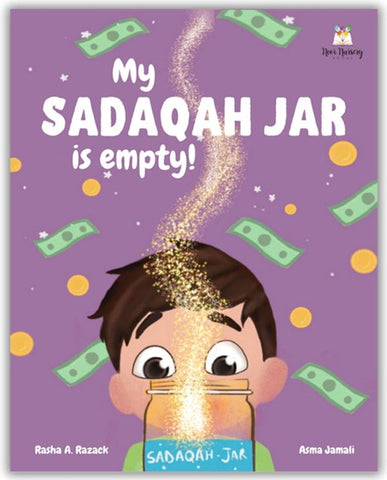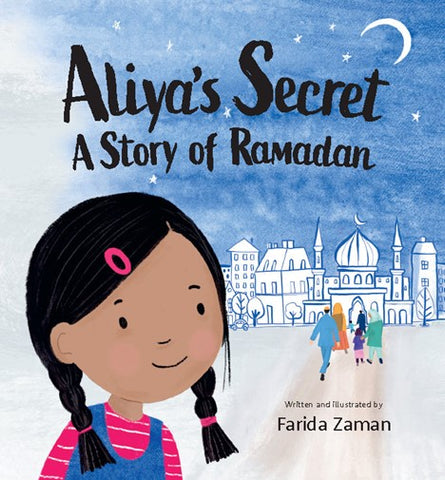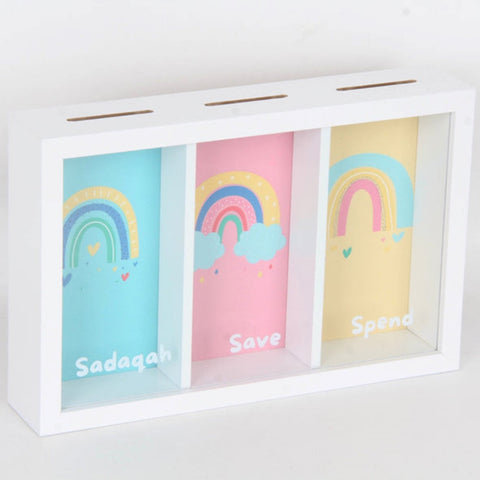With Ramadan 2024 about to arrive, Crescent Moon Bookstore highly encourages parents to introduce their children to the concept of Sadaqah in Islam. This week, we explain how you can talk to your kids about this beautiful and highly rewarding act of Sunnah.
As we write this blog, our Palestinian brothers and sisters are suffering unimaginably at the hands of the occupying Israeli forces. Please consider donating to the Palestinian Children's Relief Fund, a credible organization providing relief and assistance in the region. If you are looking for books that talk to kids about Palestine, here is our latest book listing that celebrates Palestinian stories and authors.
As Ramadan inches closer, families worldwide prepare in different ways; some make it a point to memorize the Holy Quran, while others read Ramadan-themed books, and others sit down with children to learn more about the obligations of the Holy Month.
A vital obligation of Ramadan is Charity or Sadaqah. Read on as we discuss how parents can teach their children all about it.
Psst…if you still have some Eid gift shopping to do, we have 10 of the top trending Eid gifts for kids right here!
What is the Meaning of Sadaqah in Islam?
In literal terms, Sadaqah means “righteousness” or “goodness.” In modern days, Sadaqah has come to signify an act of kindness or a virtuous deed that one does for the sake of Allah SWT without the expectation of receiving anything back.
Sadaqah or charity is an extremely rewarding act in the eyes of Allah SWT, and it comes from what we rightfully possess.
When asked about the reward for Sadaqah, the Prophet PBUH said,
“Many times, much and more still with Allah SWT.”
The Sahaba and the Sahabiyat of the Prophet PBUH were known to be among the most generous in giving Sadaqah. Read more about some of the best men and women who lived in the company of the Prophet PBUH.
How Does Sadaqah Differ from Zakat?
Sadaqah differs from the annual obligatory charity that we give, i.e Zakat. While Zakat is calculated based on our earnings and assets, Sadaqah can be as small or as large as wish. While Zakat can be given only to a special section of our community, the recipients of your Sadaqah can be anyone from your family or friends or even plants and animals!
Types of Sadaqah
Primarily, there are two types of Sadaqah.
- A Sadaqah that you give once and receive the reward of either in this life or in Jannah.
- A Sadaqah Jariyah, or an ongoing charity, the reward of which you receive continuously.
Virtues of Sadaqah
Protects us from harm: The Prophet PBUH said, “Sadaqah extinguishes sins just like water extinguishes fire.” (Tirmidhi)
Erases our sins: My father died and left behind property without making any will regarding it. Would he be relieved of the burden of his sins if I gave Sadaqah on his behalf? The Prophet PBUH said: Yes. (Sahih Muslim)
Sadaqah strengthens our faith: Giving to those in need weakens the ego and purifies our ‘self,’ or the Nafs.
Eternal rewards for the giver: The rewards of Sadaqah Jariyah or ceaseless charity continue even after one passes away. (Riyad As Saliheen)
5 Ways To Teach Children About Sadaqah in Ramadan 2024
If you were a little late to jump on the New Year Resolutions wagon, fret not! Ramadan is the best time to begin new family traditions. By doing so, parents can boost Islamic values and strengthen bonds within the family unit, something that is much needed today. Here are 5 simple ways that can encourage your children to partake in Sadaqah every day this year in Ramadan!
Learn and Teach the Quran Together!
Sadaqah jariyah or the ‘ongoing charity,’ refers to the acts that keep giving even after they are done. And a prime example of this would be the teaching of knowledge. Sharing knowledge is a Sadaqah such that the one who taught it continues to receive its rewards for as long as the one who learned it practices the knowledge and shares it with others.
Take this year’s Ramadan as an opportunity to teach your children the Holy Quran as a means of Sadaqah jariyah and encourage them to teach it to their little siblings to keep the circle growing!
Donate Clothes, Books, and Toys
It is highly encouraged that we give our Sadaqah from the best of what we have. In this regard, discuss with your kids what they would like to donate to those in need. This Ramadan, they can decide to keep away a portion of their gently used possessions to share with others in need.
Sadaqah Box
Having a Sadaqah box where kids are encouraged to drop in some money from time to time is a wonderful way for them to learn to make allocations for the needy from the money they receive in the form of gifts, pocket money, or rewards. The Sadaqah Box is designed specifically for kids to learn more about charity and sharing. You can click here to buy it at Crescent Moon Bookstore.
Talk About Sadaqah of the Body and Practice it
Sadaqah is not limited to giving away material possessions. A hadith mentions that Sadaqah is due on every joint of our body every day of our lives. This includes reconciling two people, helping someone by carrying their load, feeding a hungry person, offering water to the thirsty, removing an obstacle from the path of others, or just cheering someone up with a few good words and a smile.
The best way to teach children the Sadaqah of the body is to practice it ourselves. By being exemplary in our behavior towards our family and others, we can inspire children to do the same. This Ramadan, intend to exert yourself in doing as much Sadaqah as you can and encourage your kids to do it too!
Participate in Opportunities of Sadaqah Jariyah
Involve your children when you participate in acts of Sadaqah jariyah, like building a water well or contributing towards the building of a mosque. Do it with the intention of seeking not only Allah's SWT pleasure but also showing your children the goodness that comes out of ongoing charity. Ramadan is the perfect time to maximize the benefits you can reap from your Sadaqah!
Teaching our children about the virtues of Sadaqah done with the intention of pleasing Allah SWT can open the doors of Jannah for us and for our coming generations. How have you taught your kids about it? Drop a comment and let us know!





